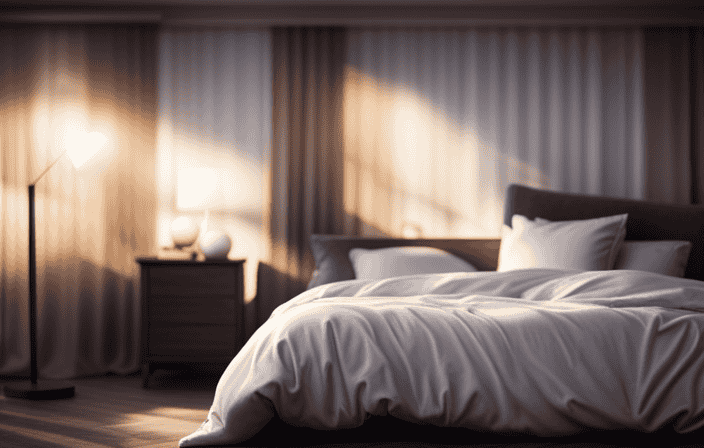Are you tired of constantly tossing and turning at night, trying to find that perfect sleep you desire?
Look no further! I have the ultimate solution for you – creating the optimal sleep environment.
Forget about counting sheep or relying on sleep aids. By following a few simple steps, you can transform your bedroom into a haven of darkness, serenity, and comfort.
From temperature control to noise elimination, this article will provide you with evidence-based strategies to ensure a restful and rejuvenating night’s sleep.
So, get ready to dive into the world of the perfect sleep environment and wake up feeling refreshed like never before.
Key Takeaways
- Maintaining a dark sleeping environment is essential for proper rest, as excess light disrupts sleep. Using floor-to-ceiling drapes, full window shades, or blackout blinds can help create a dark space.
- Eliminating sleep disruptors such as electronics and noise is crucial. Removing electronic devices from the bedroom and using earplugs or white noise machines can help create a quiet environment for better sleep.
- Bedroom hygiene plays a role in promoting restful sleep. Decluttering the space, putting away clothes, and cleaning off the nightstand can create a clear and organized environment that induces sleep. Additionally, making the bed daily and using fresh sheets improve overall sleep hygiene.
- Enhancing comfort is important for optimal sleep. Investing in a comfortable mattress and choosing a pillow that supports the neck are key. It is also beneficial to test different options before purchasing to ensure proper alignment of the spine.
Creating the Perfect Bedroom for Sleeping
I’m going to create the perfect bedroom for sleeping by following these tips for temperature control, keeping it dark, eliminating sleep disruptors, maintaining bedroom hygiene, and enhancing comfort.
To start, temperature plays a crucial role in falling asleep easily. I will aim for a room temperature of 66 °F to 70 °F, as this range is considered ideal for sleep. To keep things on the cooler side, I will invest in bedding made from natural materials like cotton or bamboo, which help regulate body temperature.
Next, I will ensure a dark environment by using floor-to-ceiling drapes or full window shades to block out excess light. I will also eliminate electronics from the bedroom to limit exposure to blue light, which disrupts proper sleep.
Noise control is important too, so I will consider using earplugs or white noise machines, and I may even soundproof the room if necessary.
Maintaining bedroom hygiene involves decluttering and keeping the space organized, as a clear and tidy environment promotes restful sleep.
Finally, I will focus on comfort by investing in a comfortable mattress and pillow that support proper spine alignment.
Overall, by implementing these tips, I can create an optimal sleep environment for better quality rest.
Temperature Control
Maintaining the ideal room temperature is essential for creating a cozy sleeping oasis. Here are four key factors to consider when it comes to temperature control in your bedroom:
-
Drop core temperature: To fall asleep easily, it’s important to lower your core body temperature. Keeping your room temperature between 66 °F to 70 °F is considered ideal for promoting sleep.
-
Keep things on the cooler side: Opt for bedding made from natural materials like cotton or bamboo, as they help regulate temperature and keep you cool during the night.
-
Use floor-to-ceiling drapes: Excess light disrupts proper rest, so create a dark space by using full window shades or blackout blinds. This is especially important in urban areas with high light pollution.
-
Eliminate electronics: Electronic devices emit blue light, which corresponds to daylight and can interfere with your sleep cycle. Remove these devices from your bedroom to help your brain enter the proper sleep cycle.
By taking these temperature control measures, you can create the perfect sleeping environment that promotes deep and restful sleep.
Keep It Dark
Creating a dark sleeping space is crucial for achieving a peaceful and uninterrupted night’s rest. Excess light can disrupt our sleep patterns and make it difficult to fall asleep and stay asleep. To create a dark environment, consider using floor-to-ceiling drapes or full window shades to block out any external light sources. Additionally, blackout blinds can be used to ensure complete darkness in the room.
To help you visualize the importance of darkness in your bedroom, here is a table outlining the benefits of a dark sleeping environment:
| Benefits of a Dark Sleeping Environment |
|---|
| Improved sleep quality |
| Enhanced melatonin production |
| Regulation of circadian rhythm |
| Reduced risk of sleep disorders |
By creating a dark sleeping space, you can optimize your sleep environment and promote better sleep quality. Make sure to eliminate any sources of light, such as electronics or streetlights, and invest in window coverings that effectively block out light.
Eliminating Sleep Disruptors
To eliminate sleep disruptors, there are several strategies you can use to minimize the use of electronics in your bedroom.
First, it’s important to limit screen time before bed. The blue light emitted by electronic devices can suppress the production of melatonin, a hormone that regulates sleep. To allow your body to naturally wind down, avoid using screens at least one hour before bedtime.
Second, consider establishing a technology-free zone in your bedroom. Create a designated area where electronics are not allowed. This will help create a mental association between the bedroom and restful sleep, reducing the temptation to use devices.
Third, remove electronic devices from the bedroom altogether. Keeping smartphones, tablets, and laptops out of the bedroom eliminates the potential for distraction and disruption. Charge your devices in another room to resist the urge to check them during the night.
Lastly, consider using alternative alarm clocks. Instead of relying on your smartphone as an alarm clock, use a traditional alarm clock or a smart device that doesn’t emit blue light. This will prevent the temptation to use your phone and expose yourself to disruptive stimuli.
Noise Control
I can minimize noise disruptions in my bedroom by using earplugs or a white noise machine.
Noise has a significant impact on our ability to sleep soundly, and it is important to create a quiet environment for better sleep.
Earplugs are a simple and effective solution to block out external noises, such as traffic or loud neighbors. They are portable, affordable, and can be easily inserted into the ears to reduce noise levels.
Alternatively, a white noise machine can be used to generate a consistent and soothing sound that masks background noise, helping to drown out disturbances and promote relaxation.
By incorporating these noise control methods into my bedroom, I can create a peaceful and uninterrupted sleep environment that contributes to optimal sleep quality.
Maintaining Bedroom Hygiene
Maintaining a clean and organized bedroom not only promotes relaxation, but also creates a calming oasis for rest and rejuvenation. Here are three essential steps to maintain bedroom hygiene for optimal sleep:
-
Declutter: Clear and organized spaces induce sleep by reducing mental distractions. Before bed, put away clothes and clean off the nightstand to limit clutter and create a peaceful environment.
-
Bed Hygiene: A messy bed can block REM sleep, so make it a habit to make your bed daily and use fresh sheets. This simple act improves overall sleep hygiene and sets the stage for a restful night.
-
Air Quality: Ensure good air quality in your bedroom by regularly dusting, vacuuming, and opening windows for ventilation. Clean air promotes better sleep and reduces the risk of allergies or respiratory issues.
By following these steps, you can create a clean and inviting sleep environment that supports your overall well-being.
Enhancing Comfort
Enhancing my bedroom comfort is essential for a good night’s sleep. Investing in a comfortable mattress and pillow is crucial for optimal sleep.
It is important to choose a mattress that suits my individual preferences and provides proper support for my body. Testing different options before making a purchase can help ensure that I find the perfect fit.
Additionally, selecting a pillow that supports my neck and aligns my spine correctly is essential for reducing discomfort and promoting restful sleep. Avoiding mattresses and pillows that cause discomfort, such as those that are too firm or too soft, can help improve overall sleep quality.
By prioritizing comfort in my bedroom, I can create an environment that promotes relaxation and enhances my sleep experience.
Establishing Healthy Sleep Habits
Establishing healthy sleep habits is like laying the foundation for a well-rested mind and body. It is important to prioritize sleep and create a consistent sleep schedule. By following a bedtime routine and avoiding stimulating activities before bed, we can signal to our bodies that it’s time to wind down and prepare for sleep. Relaxation techniques such as deep breathing exercises, progressive muscle relaxation, and meditation can also help calm the mind and promote sleep. Aromatherapy can be used as a natural sleep aid as well.
To make it easier to establish healthy sleep habits, here is a table with five tips:
| Tip | Description |
|---|---|
| Consistent Sleep Schedule | Go to bed and wake up at the same time every day, even on weekends. |
| Bedtime Routine | Create a relaxing routine before bed, such as reading a book or taking a warm bath. |
| Avoid Stimulating Activities | Limit exposure to screens and avoid engaging in stimulating activities close to bedtime. |
| Relaxation Techniques | Practice deep breathing, progressive muscle relaxation, or meditation to relax the mind and body. |
| Aromatherapy | Use calming scents like lavender or chamomile to promote relaxation and better sleep. |
By incorporating these habits into our daily lives, we can improve our overall sleep quality and ensure that we wake up feeling refreshed and rejuvenated.
Frequently Asked Questions
How does excess light in the bedroom impact sleep quality?
Excess light in the bedroom negatively impacts sleep quality. It disrupts the body’s natural sleep-wake cycle, making it harder to fall asleep and stay asleep. To create an optimal sleep environment, use floor-to-ceiling drapes or full window shades to block out light.
What are some tips for soundproofing a bedroom to minimize noise disruptions?
To minimize noise disruptions and create a quiet sleep environment, I recommend soundproofing the bedroom. This can be done by using earplugs or white noise machines, soundproofing the walls, and avoiding loud activities before bed.
Does decluttering the bedroom really have an impact on sleep quality?
Yes, decluttering the bedroom can have a significant impact on sleep quality. A clear and organized space promotes relaxation and reduces distractions, allowing for a more restful and peaceful sleep experience.
What are some relaxation techniques that can be used to promote better sleep?
Relaxation techniques such as deep breathing exercises, progressive muscle relaxation, and meditation can promote better sleep. Aromatherapy can also be used to induce relaxation. Establishing a consistent sleep routine and making sleep a priority are important for overall well-being.
How important is it to establish a consistent sleep schedule and bedtime routine?
Establishing a consistent sleep schedule and bedtime routine is crucial for optimal sleep. It helps regulate our internal body clock, promotes better sleep quality, and enhances overall well-being. It’s a key step towards achieving a restful and rejuvenating night’s sleep.
Conclusion
Creating the perfect sleep environment is crucial for a restful night’s sleep. From controlling temperature to eliminating sleep disruptors, there are several factors to consider.
Research shows that maintaining a room temperature of 66 °F to 70 °F promotes optimal sleep. Additionally, using natural bedding materials like cotton or bamboo sheets helps regulate temperature and ensure comfort.
Ensuring darkness with floor-to-ceiling drapes or full window shades aids in uninterrupted sleep. Eliminating electronics and noise, practicing good bedroom hygiene, and enhancing comfort with a supportive mattress and pillow are also essential.
By following these guidelines, you can create a sleep sanctuary that will help you drift off into dreamland effortlessly. Sweet dreams!










